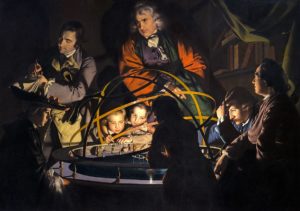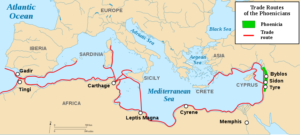 Daily Life
Daily Life
After about 1,150 BC, new and different models of life took shape. The Greeks, Romans and similar peoples were farmers and traders as before, except that they were careful to self-govern… to avoid rulership. They began using iron and generally living productive lives.
Under these conditions, the people of the Greek islands began to create science, as we understand it. Before then, people certainly invented things, but they focused on the uses of things, not their operating principles. The Greeks began to study why things worked the ways they did.
The first person to do this, as best we can tell, was a man named Thales, who was half-Greek and half-Phoenician. Thales seems to have lived between 624 and 546 BC, and he became skilled enough to predict the solar eclipse of May 28, 585 BC. (With our modern methods, we can be very precise about the dates of eclipses in the past.) That was a very big thing in the ancient world. Other conclusions Thales made were later found to be incorrect, but considering how little was known when he started, that was to be expected.
Thales was also a moral teacher. Here are three of his sayings:
That for which we blame others, let us not do ourselves.
Be rich, yes, for success is sweet. However, do not be rich badly.
A happy man is one who is healthy in body, resourceful in soul and of a readily teachable nature.
Not long after Thales, a man named Pythagoras found the crucial link between math and science. Pythagoras seems to have lived between 580 and 490 BC, and his big discovery was that musical notes could be translated into mathematical equations. As he passed blacksmiths at work one day (and as they hammered pieces of iron) he noticed that some of the sounds were harmonious. He decided that whatever scientific law caused this must be mathematical and could be applied to music. He observed the blacksmiths carefully and learned that the size of anvils they pounded on were in simple ratios: One was half the size of the first, another was 2/3 the size, and so on.
And so Pythagoras discovered the math behind musical harmony. But he also sensed that the connection between math and the universe went much deeper and spent the rest of his life on the idea. Over time, Pythagoras discovered the theorem of triangles that is named after him, the square root, that the earth is round, that planets spin, and that the planets travel around one central point.
Other Greeks, again as individuals, went on to originate drama, comedy, geometry and much more.
But not all was good about this new way of life. The Greeks, Romans, and others like them, continued one thing from the old era, which was slavery.
Slavery, at that time, was considered an economic necessity. It was slaves who generated surplus (extra money or goods) for the farmer. The slave couldn’t spend his or her own money, and so the farmer would use it to build a barn, buy an extra field and so on.
Slaves, in the early days, were seldom abused. In fact, an average farmer would own a few slaves and work with them in the fields; they could even have their own small businesses and buy their freedom… or be adopted. Nonetheless, they were enslaved, and slaves were a separate legal class from citizens.
In order to escape bad feelings, these people claimed slaves had been enslaved because of the acts of the gods, or by fate, or by cruel chance; and not because of the slave-holders. And it seems that one of the early reasons for governments was to deal with runaway or violent slaves.
Slavery made Roman and Greek citizens rich. It was an effective way of generating surplus. It was unfair and cruel, of course, but it gave slave-owners a way to expand their production (to grow and trade more food), and so many of them did.
Trading continued through this time, but the Romans looked on it as a dirty sort of thing, and many Greeks weren’t especially fond of it either. They preferred farming.
The Semites, however – the Phoenicians and the Hebrews – found much different ways of life. Both the Phoenicians and the Hebrews thrived between 1,200 and 800 BC, precisely the centuries when there were no large and aggressive kingdoms dominating the Mediterranean. In other words, a lack of dominating rulership gave them free space in which to live in new ways.
The Phoenicians continued as they had been, building a way of life designed for commerce. Rather than trying to conquer their neighbors, they wanted to conduct business with them. This was radically unlike the rulerships of Mesopotamia, and indeed it was unlike most rulerships, ancient or modern.
The Phoenicians spread this way of life all across the Mediterranean. They formed hundreds of little communities (very few of them exceeding 1,000 people) all across the area. These were really just trading outposts, with warehouses, some houses, boat repair facilities, other necessary shops, and a temple (they always brought their religion with them). The very first settlers of many European cities were Phoenicians living in such trading outposts.
You can see the Phoenician trade routes of the era on this map:

Because they traded so widely, there were many people they couldn’t communicate with, and some who might be hostile. And so they developed something called mute commerce (mute means unable to speak.) The Greek historian Herodotus described it this way:
As soon as they arrive, they unload their goods, and having displayed them in an orderly way along the beach, there leave them, returning to their ships, raise a great smoke. The natives, when they see the sample, come down to the shore, and laying out to view so much gold as they think the wares are worth, withdraw to a distance. The Phoenicians then come ashore again and look. If they think the gold to be enough, they take it and go their way; but if it does not seem to them sufficient, they go aboard the ship once more and wait patiently. Then the others approach and add to their gold, till the Carthaginians are satisfied. Neither party deals unfairly by the other: for they themselves never touch the gold till it comes up to the worth of their goods, nor do the natives ever carry off the goods until the gold has been taken away.
The Phoenicians, who often lived immediately next to Greeks and traded with them, invented the alphabet, many metalworking and artistic techniques, units of weights and measures, and many musical instruments.
* * * * *
Please take a look at our subscription letters. You can review the back issues here and order here. Professionals in the business have begged us to raise our rates, but we have subscribers on limited incomes, and so we haven’t. Given the present inflation we may have to, but for now annual subscriptions remain at just $99.
